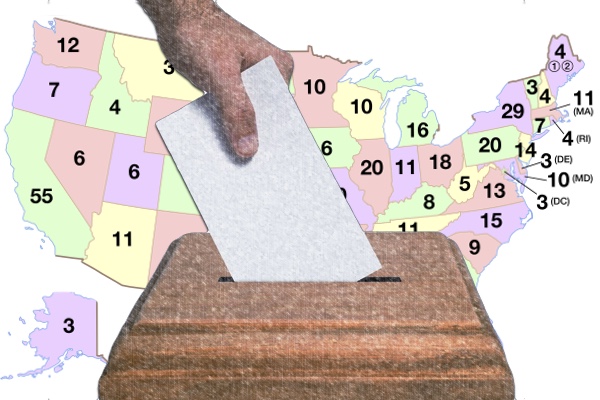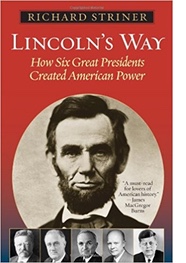America in Crisis: Dangerous Flaws in the Structure of Our Government Could Lead to Our Undoing

Fourth in a series: America in Crisis
If American democracy these days is in crisis, the structure of our government is part of the problem. This goes beyond the issues that have led some foreign observers to describe us a “flawed democracy.” Our system may be democratic in certain respects, but in other ways it is profoundly anti-democratic.
 The
American Revolution produced a republic that was not
a democracy as the term was then understood. A republic is a society
that functions through elective institutions — without a monarch.
But such a system was not
regarded as synonymous with democracy
in the days of the Founding Fathers.
The
American Revolution produced a republic that was not
a democracy as the term was then understood. A republic is a society
that functions through elective institutions — without a monarch.
But such a system was not
regarded as synonymous with democracy
in the days of the Founding Fathers.
Aristotle, in his Politics, argued that power in society can be gathered into only three forms: power in the hands of one person, power in the hands of a few people, or power in the hands of many people. “Monarchy” denoted a system that placed all power in the hands of one; “aristocracy” a system of power in the hands of a few; and “democracy” power in the hands of many. Any one of these systems could become corrupt: monarchy could degenerate into despotism, aristocracy could turn itself into an oligarchy; and democracy could become mob rule.
Centuries after Aristotle, the Greek historian Polybius wrote that an ideal commonwealth should balance these three forms of power against each other so that none could become tyrannical.
It is not at all hard to discern the influence of these teachings in our constitutional division of power between the President (power in the hands of one), Senate (power in the hands of a comparative few), and House of Representatives (power in the hands of many). Our republic contained a democratic element in the lower house of Congress, but the republic as a whole was not designed to function as a full-fledged democracy.
Our republic would evolve over time into a self-proclaimed democracy, just as Great Britain’s constitutional monarchy became a different kind of democracy. In America this process was consummated by the 1830s when Andrew Jackson and his followers created the Democratic Party and the French aristocrat Alexis de Tocqueville was so enthralled by the emergence of a democracy growing to continental size that he came to the United States to study the experiment and wrote his classic work Democracy in America.
But our evolution into a democracy is far from over and our current situation shows how far we have to travel.
Since the United States was built as a complex republic, majority rule can be thwarted. This may be defensible if and when a wayward majority threatens our common civil liberties. But it is not defensible when it leads to the kind of travesty that occurred last year when the Electoral College overturned the vote for Hillary Clinton.
That was nothing less than an outrage. It was also an American calamity. The American system failed us — miserably.
The Founders intended the Electoral College to work as a force for enlightenment. Alexander Hamilton, in The Federalist # 68, wrote that the task of selecting a distinguished person to serve as president should be made by “a small number of persons, selected by their fellow-citizens from the general mass” who would “be most likely to possess the information and discernment requisite to such complicated investigations.” In other words, The Founders designed the Electoral College as a filter. It would prevent the presidency from falling into the hands of incompetents — like Donald Trump. The Electoral College no longer fulfills that purpose. And its current operations are perverse in another respect that is far more germane to our current situation and our current political culture.
There is nothing in the Constitution requiring electoral votes in each state to be allotted by winner-take-all. But that is the system that most of the states have adopted.
Inclose elections, huge numbers of votes may get nullified in this way. That is what happened to the millions of people who marked their ballots for Hillary Clinton. Their votes disappeared in the allocation of Electors in the swing states.
Even if a presidential candidate wins a given state by a margin of one single vote, that candidate gets everything — every single one of that state’s electoral votes — and the people who voted for the other candidate get nothing. They have been robbed of their voice. Their votes might just as well have been stolen through outright fraud.
What is it like to be a member of the Electoral College — an “Elector” — in our “democracy?” Do these people feel proud of the fact that they are nothing better than automata, participants in a charade? They neither deliberate nor vote in a manner that presents any accurate version of the balance of opinion in their state. They merely take an oath — an asinine oath — to go along with the rule of winner-take-all or else be branded “faithless” electors. Faithless? What manner of “faith” is involved in this system?
The popular vote was overturned in 2000 and again in 2016. If this continues to happen on a regular basis, Americans will be up in arms — as they certainly should be.
Another anti-democratic element in our system is the power of the Supreme Court to be our constitutional arbiter. Just as there is nothing in the Constitution to justify the current workings of the Electoral College, there is nothing in the Constitution that gives the Supreme Court judicial review on constitutionality. In fact, the Constitution says nothing whatsoever in regard to disputes about the meaning of constitutional text. That is one of the major flaws in our Constitution.
In 1803, the Supreme Court gave itself the right of constitutional review in the case of Marbury v. Madison. Some famous presidents regarded that decision as usurpation: Jefferson, Madison, Jackson, and Lincoln, to name the most prominent. In Lincoln’s first Inaugural Address, he challenged the right of the court to rule on matters of constitutionality. He had earlier proclaimed that the Supreme Court decision in the 1857 Dred Scott case should be ignored or treated with contempt.
The American form of judicial review has not been copied by many other democracies. Most of them have turned to the method developed by an Austrian legal scholar named Hans Kelsen. The Kelsen procedure sets stricter parameters on the power of courts to decide constitutional questions.
Unlike the American model of judicial review, in which constitutional issues do not arise until a relevant case has come to court, the Kelsen model separates constitutional judicial review from other proceedings. It establishes special constitutional courts whose members are drawn from a pool of legal scholars and who serve for limited terms. These courts can be approached at any time by almost anyone, and their decisions may prove to be short-lived because of the limited terms of the judges.
Such a system is obviously far more responsive to democratic processes. We, on the other hand, are stuck with a system so quirky that even the most wholesome and widely-supported policies can be killed — for a generation or more — by the vote of five perverse judges. That is what happened in the Citizens United case and in related decisions that struck down the power of Congress to regulate the power of money in politics. Now billionaires can flood the electoral process with vast sums of money through super-PACs designed to overwhelm the rest of us.
Everyone knows that the Supreme Court is drenched in politics and that our partisan fights to pack it one way or the other are nothing short of vicious. The struggles are vicious because the stakes are so high: the Supreme Court has the power to thwart the democratic process for decades on end through the lifetime tenure of the justices.
That’s nonsensical. And it can lead to disaster, as the Dred Scott decision of 1857 led to disaster. That decision was framed by Chief Justice Roger Taney to “settle” the slavery issue. What it did was to push the United States further into bloody disunion. Republicans in the Civil War Congress considered some angry proposals to abolish the court altogether or replace it with a new and different one. Congress did change the size of the court and then the Thirteenth Amendment overturned the Dred Scott decision.
The Electoral College and judicial review can thwart majority will, as does the basic set-up of Congress. Every single state in our Union gets the very same number of United States senators: two. That means that as our population sorts itself out between the great urban centers and the sparsely populated hinterland — a process that is playing out now with increasing velocity — the latter states will run roughshod over states where the rest of us live. Their block of senators will dominate the rest of us. According to political scientist David Birdsell: "By 2040, 70 percent of Americans are expected to live in the 15 largest states, which are also home to the overwhelming majority of the 30 largest cities in the country. By extension, 30 percent of Americans will live in the other 35 states. That means that the 70 percent of Americans get all of 30 Senators and 30 percent of Americans get 70 Senators.” And all over the country our congressional districts are designed by the blatant tricks of partisan chicanery to highjack the democratic process.
If Donald Trump, who lost the popular vote to Hillary Clinton, makes good on his threat to over-turn Roe v. Wade — overturn it by packing the Supreme Court with right-wing ideologues — and if the popular vote in the 2020 election is overturned by the Electoral College, and if the widespread gerrymandering of congressional districts leaves millions of people feeling dispossessed, depend upon it: our land will be convulsed and the rage of the decent American majority will surge as it has never surged before.
And then — who can say what will happen to our country?